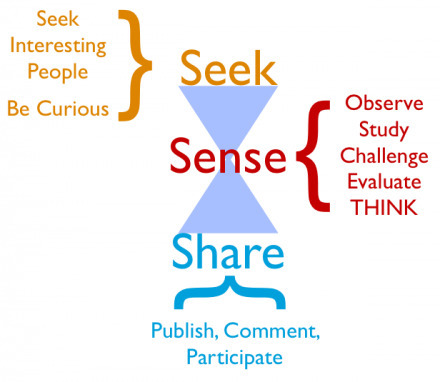Great source for Information Professionals about curation as a key information skill for 2012:
This great piece was written by Tim Kastelle - it is one of the best articles on curation, the observations and insights take this to a whole new level. So much to digest, lots to ponder about the possibilities that await us in 2012 and beyond.
Here are some of the highlights:
**"We create economic value out of information when we figure out an effective strategy that includes aggregating, filtering and connecting."
**"Filtering is what helps us deal with the vast amount of information available to us."
"...the real question is, how do we design filters that let us find our way through this particular abundance of information?
****And, you know, my answer to that question has been: the only group that can catalog everything is everybody." (Clay Shirky)
**We try to filter information so that we end up with something that is relevant to us – it helps us learn something, it helps us solve a problem, it helps us develop a new hypothesis about the world around us.
**These are all connections – and this is what really drives value creation.
**However, we can’t connect without some filtering going on. So filtering is important, and it’s a term that includes several different sub-types. I can think of at least five forms of filtering.
...we can use these ideas about filtering to help with business model innovation by changing where it takes place in the value network.
**One of Shirky’s points is that since Gutenberg, the economic logic of publishing required publishers (of books, music, movies) to act as filters in order to maximise their investment.
**As publishing and filtering has shifted out to human networks, publishers no longer need to fill this role.
**Someone (or some network) needs to, and since that creates value, it’s something that can perhaps be monetised.
This piece was curated by Robin Good brief commentary by Jan Gordon
Check this video: http://vimeo.com/8748509
Read the full article by Tim Kastelle: http://timkastelle.org/blog/2010/04/five-forms-of-filtering
Via Robin Good, janlgordon, Karen du Toit



 Your new post is loading...
Your new post is loading...









